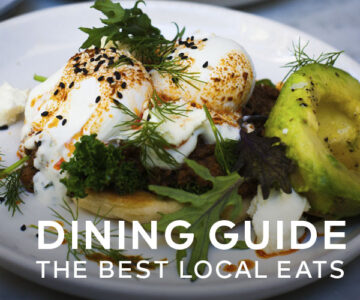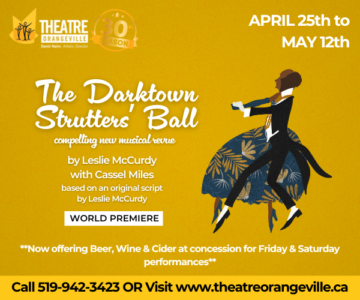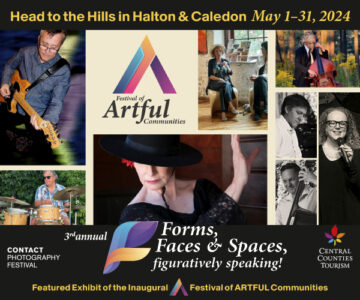Dufferin’s Living Library
How You Walk The Line: An advance stroll through Dufferin’s Living Library
As I passed through my living room recently, I came across a version of the list you see above. It was in my wife Brandy’s handwriting. She had left the house moments before, noting that she was “just going out to Sears to pick up a few things.”
I momentarily entertained the thought that Sears had undergone a radical transformation, and that our dinner conversation was about to enter a whole new level of complexity.
“Oh, that,” Brandy said, when I questioned her about it later. “That’s a wish list for our Living Library.”
Let me back up a little.
The thing is, I’m pretty much purebred hick – a pasty-white, west Dufferin pig farmer’s son. Brandy shares similar roots. Well, okay. Her dad had cattle. You know those uppity cattle people. They’d want me to mention that.
Anyway, to put it mildly, we’re not the first couple who would pop into your mind when you think about diversity in Headwaters. What’s more, it’s fair to say that while travel has exposed us to some other cultures, our day-to-day lives here, and those of most Headwaters residents, seem to offer only limited opportunity to engage with people from other walks of life.
So perhaps you can be forgiven if, like me, you find that just reading that list makes you reconsider your definition of diversity.
Indeed, the list itself is nothing more than a collection of people known to live in this community, put together by a handful of brains on a committee. In terms of true diversity, it is by no means complete. Any number of other religions might be found there, any number of nationalities, any number of people with physical, social or intellectual differences from the “norm.” It’s an attack of the “isms”: ablebodiedism, ageism, fattism, heterosexism, racism, sexism.
Brandy had a long career in education. She knows that if you spend half an hour on any elementary school playground, there’s a good chance you’ll see every intolerance you can imagine, and possibly a few you’ve never even thought of. After retiring in 2007 and relying on an extensive background in women’s equity issues from her education days, she took on a half-time assignment to serve as diversity co-ordinator for Dufferin Child and Family Services, or DCAFS.
It sounded deceptively straightforward to me at first. Not very different from Brandy’s days as a principal: “Everyone play nice or you’ll have to come to my office and write a letter to your parents explaining why you’ve made this bad decision.”
Of course, nothing is ever that easy. For perhaps the first time, her status as a member of healthy, white, middle-class Dufferin was a weakness, not an advantage.
So for the last year or so, she, along with me vicariously, has been on something of a steep learning curve. She tells me I’m not getting it when I call her new job “swatting WASPS.”
All of which brings us back to the Living Library. The concept was first staged in Denmark in 2000. Since then, it’s become an international movement, described as “an innovative method designed to promote dialogue, reduce prejudices and encourage understanding.”
At a Living Library event, participants, or “readers,” sign out “books.” But there’s a twist: the books are real people. To “read” a book is to engage in informal conversation with people on loan.
Usually, these “living books” are individuals who face prejudice, stereotyping or misunderstanding. Readers are encouraged to “take out their prejudice,” and read books whose views are very different from their own. Of course, rules of civil discourse apply, but the idea is that through personal contact, barriers can be broken down; participants can see the human in the “other” and realize that a stereotype never does justice to a person.
Experience from other Living Libraries, which are now being held around the world, shows that readers also take books out for other reasons. Sometimes it’s to seek advice from, say, a title like “Ex-alcoholic.” Sometimes it’s plain old curiosity. At a recent Living Library at the University of Guelph, for example, “Phone Sex Worker” was booked solid.
On October 22, the Diversity in Dufferin Network will stage Headwaters’ first Living Library. To give you a sneak preview, I’ve been off talking to a few books.
Think of it like this: An immigrant, an imam and a lesbian walk into a magazine story…
A Book About Immigrants
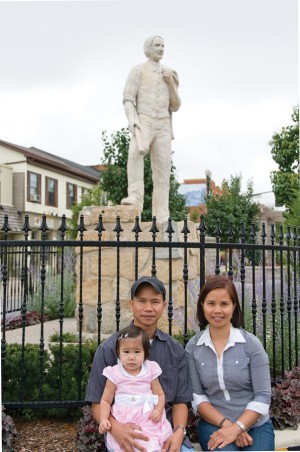
Gerelyn and Rex Tabsing take Rex’s daughter Sophia for a walk along Broadway. The sister and brother founded Orangeville’s Filipino Community group to help immigrants adjust to their new home. Photo by Pete Paterson.
Sometimes what looks like oppression to some of us feels like opportunity to others. And that’s just how many members of the region’s Filipino community see it.
I’ve always been a bit queasy when I hear about engineers or nurses or teachers who, qualified professionals in their home country, come to Canada to work as caregivers and nannies. It seems like a demeaning waste of talent.
Rex and Gerelyn Tabsing, however, beg to differ. This eloquent and formidable brother-sister duo from the Philippines see it as a lifeline.
You don’t so much read these two books in an hour-long conversation as flip through a few fascinating pages. Gerelyn, a teacher back home, has been here ten years and Rex, who has a degree in computer engineering, for two. Economic conditions were one factor in their decision to leave the Philippines, where one Canadian dollar is worth about forty pesos. However, both stress repeatedly that safety was a more important concern.
“Back home,” says Rex, “you never knew, day by day, what was going to happen: the crime, the politics, the poverty.” Gerelyn adds, “And this is the safest place in the world.”
Gerelyn was the first member of the family to arrive, posted in Caledon through the federal government’s Live-in Caregiver program as a nanny. Under the terms of the program, after twenty-four months, live-in caregivers are eligible to apply for permanent resident status, and Gerelyn did. “Once you’re a permanent resident,” she says, “you can bring family members in.” That meant that in 2004, she was finally reunited with her son Marjone, now fourteen.
As to the loss of educational qualifications, Gerelyn and Rex both argue it’s not entirely arbitrary. “Someone with a two-year college diploma at home is like a high-school graduate here,” Rex says.
Together, Rex and Gerelyn have spearheaded development of the Orangeville Filipino Community group, or ORFILCO. With about fifty members, the group promotes camaraderie among Filipino people in the area, and tries to help newcomers avoid isolation. “When people come as caregivers and they’re living in someone’s house, it can be quite lonely, especially if there’s a language barrier,” Gerelyn says. “Many have come alone, and they don’t realize there’s a Filipino community here.”
ORFILCO also helps its members with academic and language upgrading, working to develop programs with Georgian College and other institutions and even bringing in private tutors. “The schools only offer courses on weekdays,” says Gerelyn. “If you’re a live-in caregiver and Sunday is your only day off, it doesn’t work. So we started bringing someone up from Mississauga on Sundays.”
Meanwhile, Rex sees other benefits to education. One of his jobs is as a part-time driving instructor, serving a mostly Filipino clientele. Teaching people to drive, he says, “also gives them confidence about living here. It’s like ‘Yes! I can do it!’”
After only two years in Canada, Rex, father of an eighteen-month-old Canadian-born daughter, talks like a man who has found home: “I completely feel I belong,” he says. “Everyone is so warm, they don’t discriminate.” However, he has also been willing to make adjustments: “You have to observe the culture, and you have to adapt to the climate.” (After a lifetime here, I’m still doing both.)
Gerelyn, who recently became a Canadian citizen, runs her own business. Called Premium Employment and Integrated Services, it is one of at least two agencies in the area that matches Filipino immigrants with families who need caregivers. She has also recently qualified as a legal assistant, but with all that, still continues to work part-time by choice as a caregiver.
She remains a passionate advocate for the government initiative that brought her here. “We’re very thankful to the government for providing the Live-in Caregiver program,” she says.
A Book about an Imam
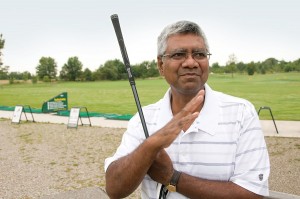
Khwaja Ajib and his wife moved to Orangeville in 1976 because they wanted to raise their children in a small town: “I have been surrounded by fine human beings. What more could I want?” Photo by Pete Paterson.
When you think “Islam,” you might not automatically think “Johnny Cash.” Nonetheless, for Khwaja Ajib, owner of Dufferin Glen Golf Academy in Mono, there’s a direct connection: “It’s about how you walk the line.”
Khwaja is well known in the community. He has lived in Orangeville since 1976, after arriving in Canada from Guyana in 1970. He operated First Choice Photo Lab in Orangeville for fourteen years before starting the golf business. What most people don’t know about Khwaja, however, is that he’s also a Muslim imam. It’s a bit like “little mosque on the driving range.”
There are not likely many job titles about which there is more fear and ignorance in North America than that of imam. At its worst, these leaders of the Muslim faith are seen as religious zealots who incite terrorism. It takes Khwaja only a few moments to illustrate how far from reality that image is.
Perhaps the first misconception is that imams are the Islamic equivalent of ministers or priests. In fact, the term more accurately refers simply to a leader in the Muslim community.
“No one ordains you in Islam,” Khwaja says, explaining that, yes, imams do lead prayers, but so do others. The role is more about being generally accepted as someone knowledgeable about the teachings of the Qur’an and the prophet Muhammad. “In fact, there are many among us who could say they are an imam,” he adds.
With a very small Muslim population in Headwaters, and the nearest mosque located in Brampton, Khwaja isn’t really even comfortable being called an imam. “I don’t carry a title,” he says. “When you have a congregation, you are entitled to use the term.”
That may be so, but it’s doubtful that grateful Muslim families at Headwaters Health Care Centre see it that way. Khwaja “set something up” with the hospital chaplain. Now, if a Muslim patient is dying, he attends to deliver prayers, or in a Christian vernacular, last rites.
In Khwaja’s view, the idea that Islam is a rigid religion is also a misconception. “When we were raising our family, we chose not to be part of any particular group,” he says, in reference to denominations within Islam – primarily Sunni or Shi’a. “Muhammad taught people how to live, and Islam helps you in how you live. People choose from it what they want.” Later, he sets his own views in universal terms: “Just take the Ten Commandments and run with it.”
Though Khwaja admits that he “prefers to see the good side of things,” he is emphatic that neither his colour nor his religion has played any significant role as far as his life in Headwaters is concerned. “It’s been great for me,” he says. “I’ve never experienced anything bad. We moved here because we wanted to raise our kids in a small town.”
While he acknowledges that “there will always be issues, people who feel these things,” he also points out that “everybody could encounter something at one point or another, not only my group or race.” He sees hope for the future too. “The younger generation is better at looking past a lot of things, at respecting each other as individuals.”
For Khwaja, that respect for the individual is key: “Do we look at a person’s religion, or their good deeds? I want people to judge me for who I am, not for my religion. I have respect for people in this community, and they have respect for me.”
After living here all these years, he says, “I have been surrounded by fine human beings. What more could I want?”
A Book about a Lesbian
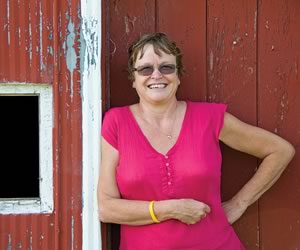
Marianne Breadner works with youth on matters of gender identity. With a masters degree in social work, she has been a driving force behind the promotion of diversity in Headwaters. Photo by Pete Paterson.
Marianne Breadner began learning about diversity early, and she has learned about it often.
One of her first lessons was in grade two. The teacher had the students engaged in the creation of a Mother’s Day gift – a wishing well, made from baby food jars and clothespins and glue. No doubt as direct and open then as now, a young Marianne pointed out her problem with the plan: “But I don’t have a mother.”
Unprepared for the fact that Marianne’s mother had died, and that she was being raised by a male single parent, the teacher instructed her to make the wishing well anyway. “It sat on the kitchen table for days,” she says. “I kept looking at it, wondering what I was supposed to do with it. Finally, my dad made it quietly disappear.”
Brandy and I attended Marianne’s wedding in August of 2003, just a couple of months after same-sex marriage became legal in Ontario. Unlike the wishing well idea, the wedding was very much a plan of her enthusiastic making.
It was as fine an old-fashioned, traditional Dufferin pairing as I can recall. Gathered in the backyard on a beautiful summer afternoon in Melancthon, the hundred or so guests sipped drinks and spoke in hushed tones, awaiting the big event. Many of the nearby neighbours were in attendance – an elderly woman from the next sideroad, and a large contingent of farmers, likely thinking about how they were losing a day on the fields.
The clergy made the usual testaments to commitment and devotion, the guests applauded, a kiss was exchanged. There was a barbeque and a party where someone played guitar and everyone sang.
Though same-sex marriage can ignite a firestorm for some in the outside world, on this day the fact that the toga-clad couple happened to both be women was about as relevant as the pattern of black and white spots on the Holstein cattle that gathered, like so many church ladies in print house dresses, along the back fence during the ceremony.
Marianne has been a driving force behind the promotion of diversity in Headwaters, and it’s born of her own experience. “When I first moved here in 1972,” she says, “people were still making Catholic jokes.” During high school, fair-haired and light-skinned, she says, “No one realized my dad was East Indian, so I’d hear all the ‘Paki’ jokes. Of course, I never said anything. I learned to keep my mouth shut.”
By the time she came out about her sexual orientation in her early thirties, Marianne had conformed in other ways too. She was married to a man, had kids. However, not one to do things by half measures, once she decided to tackle the truth, she put her heart into it. Within a few years, she was running a group for lesbian, gay, bisexual and transgender youth. In the eleven years since, the group has provided support for 190 young people between the age of fourteen and twenty-one.
Discrimination based on sexual identity remains among the most difficult to overcome, and it can be especially hard for adolescents.
“Some people think it’s easy for kids to be queer these days, but it’s not,” Marianne says. “The worst put-down at high school is still to call someone ‘gay.’ There are also huge family issues. I know of at least one girl right now who would be physically assaulted if her father found out that she’s a lesbian… Males tend to experience even more discrimination than females.”
Responding to those who argue being gay is a matter of choice, she adds: “Young people I work with ask, ‘Why would anyone ever choose this?’”
As if further proof were needed that this form of discrimination is alive and well in Headwaters, you will note that Marianne’s partner is not identified in this story: she feels the potential impact on her career is simply too great.
Indeed, in agreeing to be interviewed, Marianne herself admits, “I hesitated. People make heterosexual assumptions about you all the time and they’re nice to hide behind. They’re safe. Coming out is risky, even as a nice, white, middle-class adult. So for kids, it’s no wonder they’re so scared.” Still, there are no regrets: “It takes so much energy to be out, but it takes more to be ‘in.’”
As an offshoot of doing a master’s degree in social work, Marianne applied for and got the Ontario Trillium Foundation grant that allowed DCAFS to take the lead on diversity.
“Having run the LGBT youth group for eight years, I realized the struggle going on – not just about sexual orientation, but also because the county is changing. There are more and more racial and religious interests, more visible minorities, more disabled people … I tried to see it through that lens, with my eyes wide open.”
So it turns out that when an immigrant, an imam and a lesbian walk into a magazine story, they are more alike than different. Their books may hold different chapters, be written in different styles, but their plot line is much the same. Bravery and leadership are more prominent themes than race, religion or sexual orientation. Common human decency is the powerful thread that binds their stories together.
For all the differences we have, all the contrasting viewpoints, for me anyway, diversity is pretty straightforward after all. I’m with Khwaja and Johnny. It’s about respect for the individual – even those uppity cattle people. It’s about how you walk the line.
For more information about Dufferin’s Living Library, see www.livinglibrary.ca; the worldwide Living Library initiative, see www.living-library.org;

